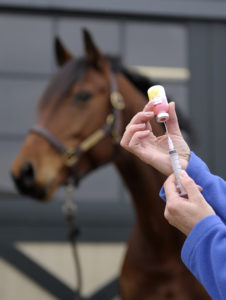The following is adapted from the AAEP Guidelines on Adverse Reactions:
Have you ever had a flu shot and then felt tired, groggy, and slightly sick for a day or two afterwards? A similar event can happen to our horses when we vaccinate them against disease.

Caption:
Dr. Karen Wolfsdorf preparing to adminster vaccinations at a Central Kentucky farm on Jan. 19, 2011. imagery for The Horse magazine
Origs1 image898
Photo by Anne M. Eberhardtcular
After receiving a vaccine(s) intramuscularly, some horses experience local muscular swelling and soreness or transient, self-limiting signs including fever, anorexia and lethargy. Severe reactions at sites of injection can be particularly troublesome, requiring prolonged treatment and convalescence. Systemic adverse reactions (such as hives, colic or anaphylaxis) can also occur. Other systemic adverse reactions have been anecdotally reported.
Adverse reactions are not always predictable and are inherent risks of vaccination. Therefore, it is recommended that horses not be vaccinated in the 2 weeks prior to shows, performance events, sales or domestic shipment. Some veterinarians may elect not to vaccinate horses within 3 weeks of international shipment.
Vaccines should always be administered by, or under the direct supervision of, a veterinarian, as the possibility of adverse reactions (including anaphylaxis) exists with the administration of any vaccine.
If you notice any of these signs post-vaccination, please give us a call so we can discuss the appropriate course of action. In most cases, some TLC and having a couple of days off of work is enough to get your horse feeling back to their normal self.
